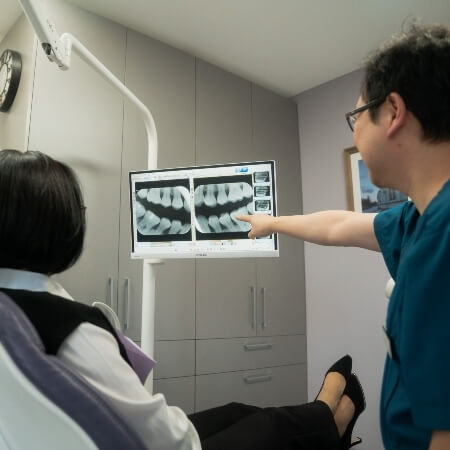TMJ Treatment at St. Leonards Square Dental Care
 Your temporomandibular joints (TMJ) are located just in front of either ear. Each one moves thousands of times per day. Every time you eat, yawn or talk to a friend, you’re moving your TMJ.
Your temporomandibular joints (TMJ) are located just in front of either ear. Each one moves thousands of times per day. Every time you eat, yawn or talk to a friend, you’re moving your TMJ.
Symptoms of TMJ Disorder
TMJ disorder can present itself in different ways. Some of the more common symptoms include
- Pain in or around your joint
- Limited opening
- Popping or clicking noises
- Frequent headaches
- Waking up with a sore jaw
- Flattened, worn, or broken teeth
- Deviation to one side or the other (when opening)
- Sleeping disorders
TMJ disorder (TMD/TMJD) occurs when there are structural problems or strain involving the joints. For instance, there could be muscle fatigue from excessive clenching and grinding or a previous injury to the jaw. Even if your teeth are biting together improperly, it can cause your TMJ to shift from a natural movement to an atypical one that strains the joint. Over time all of those unnatural motions can lead to internal damage and joint strain.
Occasionally degenerative bone diseases can also contribute to TMJ problems. We’ll take an X-ray or scan of your jaws to fully assess the internal disk and anatomy involved to pinpoint the source of your pain.
Most TMJ disorder treatments involve some type of occlusal splint therapy or nightguard. These devices eliminate the tension on the joints, allowing the muscles to relax. The less overexertion there is, the easier it becomes for the TMJ to rest. Especially if you’re prone to clenching and grinding your teeth.
Some people will also find it helpful to invest in teeth straightening. Since misaligned teeth can alter the way you chew, straightening them may aid in better TMJ motion throughout the day. We can conduct an orthodontic evaluation to determine if bite misalignment (malocclusion) may be a determining factor.
Do you have missing teeth? Restoring your smile can take extra pressure off of the parts of your mouth that are working overtime. Establishing a healthy overall bite allows your TMJ to work more efficiently, reducing strain and atypical motions.
Short-term relief can typically be found by adjusting your diet and sticking to softer foods. Avoid hard or chewy textures as they exert extra pressure on your TMJ. You may also want to cut food into smaller bites.
Applying a warm compress during flare-ups can offer temporary relief. As will taking an over-the-counter anti-inflammatory medication.
It’s best to avoid stock mouthguards or splints sold in stores. These bulkier appliances tend to fit more loosely and add to the discomfort.
Custom Occlusal Splints
Are you looking for TMJ treatment St Leonards? Contact our office to learn more about custom splints and other therapies.
CONTACT US
Any invasive or surgical procedure may carry risks. Before moving forward, it is recommended that you seek a second opinion from an appropriately licensed medical professional.


